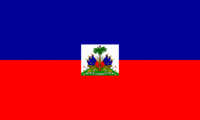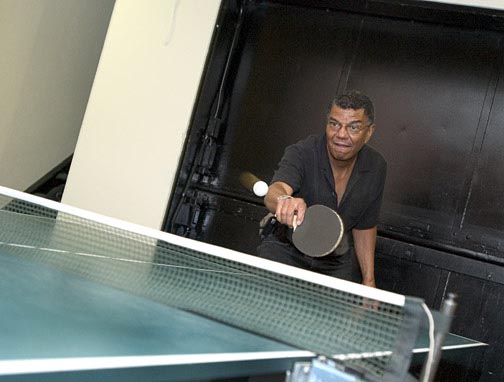
[Image above: Ed Ruscha]
"This is kind of a personal question, but does music ever scare you?" A Manhattan School of Music student posed this unconventional inquiry on Monday toward the end of an afternoon master class with Fly. The musicians seemed slightly caught off guard, but they dove in. Drummer Jeff Ballard recalled being severely freaked out by what he referred to as the "bestial" energy of a recent Sam Rivers recording. Saxist Mark Turner, whose calm, cryptic responses throughout the afternoon had a strong Zen aura, grinned faintly and answered, "Yeah, it does--and I kind of like it."
I stumbled into the event pretty much by accident. As previously reported, I had been meaning to catch Fly this past weekend at Jazz Standard, but it didn't work out. I wrote the group's publicist Monday morning to ask if they had any more gigs coming up and she mentioned that I was welcome at the MSM session that very day. I had to scramble a little to make it uptown, but I'm very glad I did.
Prior to this, I wasn't sure I even understood what went on at a master class. What transpired wasn't terribly different from what I'd expected: The band simply alternated between performing a tune and pausing for discussion and Q&A, a process that repeated for 90 minutes. To some the lengthy spoken interludes might have distracted from the music. I found them enthralling. Often when audience discussions go down at concerts out in the real world (i.e., outside of academia), you get a lot of audience members trying to impress one another with their supposedly sophisticated or insider inquiries. I picked up none of that from the MSM students. They seemed genuinely fascinated by Fly--their motivation was to learn, not to show off.
The talk got technical at times, but mostly it was philosophical. The band members' mini treatises on improvisational problem solving seemed only incidentally music-related. When one student asked about the players' conception of the beat, Ballard and bassist Larry Grenadier each dove deep into metaphor, with the former likening time to a curtain ("The time is draping") and the latter comparing it to a circle with the strict metronomic pulse in the center and all sorts of fruitful approximations surrounding it. The musicians returned often to the idea of tension and release, specifically the notion that supposed musical freedom means little unless it's juxtaposed with structure. Without some kind of framework to serve as contrast, Turner ventured, "The obscurity is no longer obscure." Ballard put it another way: Of musical freedom, he joked, "It's not free--it costs a lot.
Also, fascinating insights into process, preference, personality. "How did you find your sound?" Ballard struggled with his words and then simply began striking different parts of his kit--a tap near the edge of the untightened snare, a thwack to the metal rim of the tom--by way of demonstrating that he simply focused on the timbres and textures he enjoyed most. When someone asked about listening preferences, Ballard and Grenadier chided Turner for his love of Depeche Mode and Echo and the Bunnymen. ("It's true," Turner professed.) Later the notion of musical personality or "concept" came up again and things once again turned reflective. Turner, a former visual artist (anyone know what particular medium he worked in?), discussed how that pursuit had come much easier to him than music and how a part of him wished he'd stuck with it. As for the notion of a concept, he was typically reticent: "I don't think I have a concept yet."
You'd never hear this sort of stuff in a jazz club, and that's probably appropriate: A lot of patrons wouldn't be interested in a hour of analytical discussion mixed in with their music. On the other hand, though, I think a lot of fans of jazz--or any other style of music, for that matter--would like to see this kind of performer/audience interplay go down outside of academia. I'm sure there are series around NYC that approximate this dynamic, but I know there's room for the model to expand further. Personally, I find it fascinating to witness musicians both practicing *and* preaching.
And speaking of practicing, the music Fly played on Monday was glorious--filled with brain-teasing restraint and forms that initially sounded conventional but later revealed mystifying idiosyncrasies. Re: this lopsided account, I don't mean to short-shrift what was played; I just wanted to point out that the talking seriously enhanced my enjoyment of the music. If it turns out that Fly-caliber jazz artists give master classes regularly at MSM, I might have to start paying tuition.


